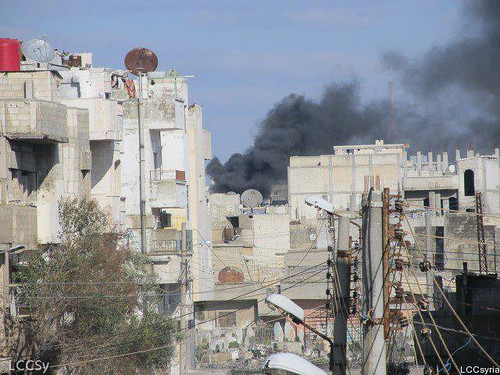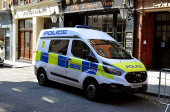
China called for an end to violence in Syria Sunday as the regime of Bashar al-Assad sparked international outrage by blocking aid from reaching the battered Baba Amr flashpoint in Homs city.
As more bloodshed was reported across Syria, Britain and Turkey joined the outcry, accusing the regime of committing a crime by barring Red Cross convoys from entering Baba Amr for the second day.
China, which twice joined Russia in blocking UN Security Council resolutions against Syria's lethal crackdown on dissent, urged all parties in Syria to "unconditionally" end the violence.
Xinhua news agency cited a foreign ministry statement attributed to an unnamed official calling for dialogue between the Syrian regime and those expressing "political aspirations."
But the official reportedly added: "We oppose anyone interfering in Syria's internal affairs under the pretext of 'humanitarian' issues.'"
As condemnation spiralled, the bodies of US reporter Marie Colvin and French photographer Remi Ochlik were flown back to Paris overnight from Damascus.
Relatives of Ochlik were there to meet his coffin as the regular Air France flight, via Amman, touched down at Charles de Gaulle airport in the French capital, an airport source said.
The two western journalists were killed in a rocket attack in the rebel Baba Amr neighbourhood of Homs on February 22.
Colvin's body was expected to be flown on to her native United States on Monday or Tuesday, according to a representative of her newspaper, The London Sunday Times.
French reporter Edith Bouvier of Le Figaro newspaper and British photographer Paul Conroy were wounded in the attack that killed their two colleagues.
Bouvier, 31, and photographer William Daniels, 34, who was not hurt in the rocket attack, have already been smuggled out of Homs by activists to Lebanon and on to Paris.
The pair recounted their harrowing experience from the moment Syrian rockets began hitting their makeshift media centre, and said Syrian forces seemed to be directly targeting journalists in Homs.
Conroy said the bombardment of the besieged Syrian city amounted to a "medieval siege and slaughter," and denounced the Damascus government as "murderers".
"It's not a war, it's a massacre, an indiscriminate massacre of men, women and children," said Paul Conroy, 47, speaking from a hospital bed in Britain after being smuggled into Lebanon on Tuesday.
The US-based Human Rights Watch (HRW) said some 700 people were killed and thousands wounded by regime forces in a 27-day blitz on Homs, before the rebel fighters withdrew.
HRW said shells sometimes fell at the rate of 100 an hour and that satellite images showed 640 buildings visibly damaged, but stressed that the real picture could be worse.
The Washington Post reported that Iran is stepping up its military and intelligence support for Syrian government troops in their crackdown against opposition strongholds.
Citing three unnamed US officials with access to intelligence reports from the region, the newspaper said Tehran had increased supplies of arms and other aid for Assad.
British Foreign Secretary William Hague said the refusal to grant humanitarian aid access to citizens affected by the violence showed how "criminal" the regime had become.
His Turkish counterpart Ahmet Davutoglu said the regime's "savagery must stop," calling for an international response.
On Friday a seven-truck convoy organised by the International Committee of the Red Cross (ICRC) and the Syrian Arab Red Crescent Society was barred from entering Baba Amr.
Syrian authorities said the decision was taken for security reasons, namely the presence of bombs and landmines.
But UN Secretary General Ban Ki-moon demanded unconditional humanitarian access to Syrian cities, saying there were "grisly" reports of summary executions and torture in Homs, Syria's third largest city.
"The Syrian authorities must open without any preconditions to humanitarian communities," he said. "It is totally unacceptable, intolerable. How as a human being can you bear... this situation."
By late Saturday the Red Cross said none of its teams had entered Baba Amr.
"We are still in talks," ICRC spokesman Saleh Dabbakeh told AFP.
Red Crescent operations chief Khaled Erksoussi said: "The authorities told us that we're being denied access for security reasons."
Syrian troops overran Baba Amr on Thursday, capping a month of shelling which HRW, quoting accounts from journalists and residents who had fled, said would start every day at around 6:30 am and continue until sunset.
It noted that Baba Amr has been an opposition stronghold since anti-regime protests erupted last March, but stressed this presence "in no way justifies the scale and nature of the attack."
The United States has condemned the "horrific" brutality in Syria while French President Nicolas Sarkozy said what is happening "is scandalous."
At least 37 people, including 14 government troops, were killed nationwide on Saturday, the Syrian Observatory for Human Rights said. The soldiers died in clashes with deserters near the southern town of Daraa.
The authorities reported two dead in a suicide car bombing in Daraa province where the anti-regime uprising erupted, the latest in a wave of such attacks since December that the regime has blamed on Al-Qaeda.
AFP, photo: FreedomHouse









































